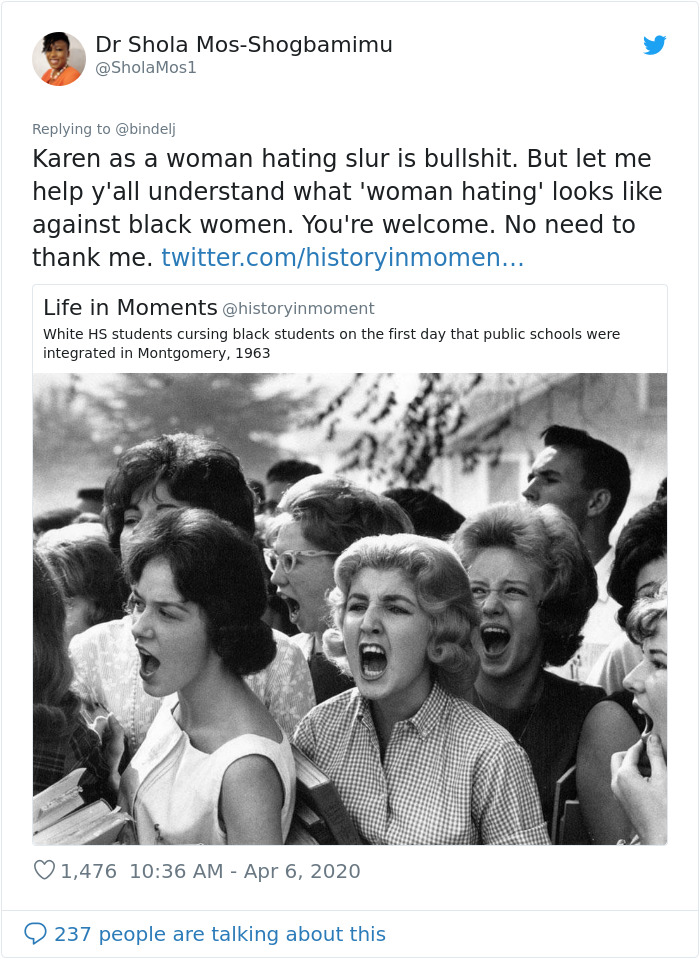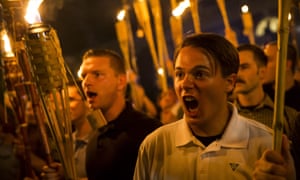Bells
Staff member
Considering what usually precedes it, how bad do you think it is?How bad is "Karen" on the scale of name-calling? Sexist? Racist? Misogynistic? Classist? Ageist?
A young Karen likely would have been the class snitch, tattling on her classmates to the teacher to get them in trouble. Middle-aged Karen is the one asking to see your manager. And a Karen at the peak of her powers will call the police on someone for a mild inconvenience.
The most recent Karen fires came from across the Atlantic, fanned by white British women claiming that “Karen” is — wait for it — an oppressive slur. “Does anyone else think the ‘Karen’ slur is woman-hating and based on class prejudice?” tweeted Julie Bindel, a British feminist writer, whose credentials in oppression include being known for espousing anti-trans rhetoric. Nonetheless, the conversation around Bindel’s tweet included white women who did feel Karen memes were offensive. Hadley Freeman wrote in the Guardian that the Karen memes were sexist. Another viral tweet went so far as to call “Karen” the equivalent of the n-word.
As a millennial black Karen, and a child of immigrants, I find the brouhaha hilarious and twisted. “Karen” is not and will never be an oppressive slur. Anyone who disagrees can take it up with my manag … — I mean, with history.
[...]
Freeman largely ignores race in her piece, save for one throwaway line: “People of color should describe their experiences of racism in whatever language works for them.”
Well, many of us decided that Karen, or, say, Becky, works for us. Black American expression, including hip-hop, rap and remix culture, drives global social media culture and shapes language. Take Becky, for example: It was rapper Sir Mix-a-Lot’s 1992 song “Baby Got Back,” in which a white girl, disgusted by the shape of a black woman’s body, talks behind the black woman’s back to her friend Becky. Over the years, and partially thanks to Beyoncé, “Becky” was popularized in the black community to refer to a white girl, especially one with backstabbing tendencies.
The most recent Karen fires came from across the Atlantic, fanned by white British women claiming that “Karen” is — wait for it — an oppressive slur. “Does anyone else think the ‘Karen’ slur is woman-hating and based on class prejudice?” tweeted Julie Bindel, a British feminist writer, whose credentials in oppression include being known for espousing anti-trans rhetoric. Nonetheless, the conversation around Bindel’s tweet included white women who did feel Karen memes were offensive. Hadley Freeman wrote in the Guardian that the Karen memes were sexist. Another viral tweet went so far as to call “Karen” the equivalent of the n-word.
As a millennial black Karen, and a child of immigrants, I find the brouhaha hilarious and twisted. “Karen” is not and will never be an oppressive slur. Anyone who disagrees can take it up with my manag … — I mean, with history.
[...]
Freeman largely ignores race in her piece, save for one throwaway line: “People of color should describe their experiences of racism in whatever language works for them.”
Well, many of us decided that Karen, or, say, Becky, works for us. Black American expression, including hip-hop, rap and remix culture, drives global social media culture and shapes language. Take Becky, for example: It was rapper Sir Mix-a-Lot’s 1992 song “Baby Got Back,” in which a white girl, disgusted by the shape of a black woman’s body, talks behind the black woman’s back to her friend Becky. Over the years, and partially thanks to Beyoncé, “Becky” was popularized in the black community to refer to a white girl, especially one with backstabbing tendencies.
I think it's more interesting that those now whining about it in the media are attempting to alter its meaning, history and context completely.
"Karen" is usually thrown out as a label to white women who like to remind people of colour of her white privilege by being racist at people of colour and minorities. As was posted above:
In America, white women are often believed and protected at all costs, even at the expense of black lives. In 1955, it was a white woman who falsely accused 14-year-old Emmett Till of whistling at her in Mississippi, which led to him being brutally beaten and killed. Fast-forward to recent years and we still learn about black people being arrested or assaulted because a white woman called the police unnecessarily. Becky and Karen memes and jokes should be understood in this context, part of a long tradition to use humor to try to cope with the realities of white privilege and anti-blackness.
Dehumanizing slurs don’t gain their cruel power overnight. They are part and parcel of generations of violence, erasure and discrimination. Calling the Karen meme the new n-word or asserting that it is a sexist slur only trivializes actual violence and discrimination that destroy lives and communities.
And to invent oppression when none is happening to you? Well, as a Karen, I just have to say — that is peak Karen behavior.
Dehumanizing slurs don’t gain their cruel power overnight. They are part and parcel of generations of violence, erasure and discrimination. Calling the Karen meme the new n-word or asserting that it is a sexist slur only trivializes actual violence and discrimination that destroy lives and communities.
And to invent oppression when none is happening to you? Well, as a Karen, I just have to say — that is peak Karen behavior.
You left out the 'it's a label for racist white women who threaten the lives and livelihood of people of colour with her white privilege'. So I am not voting.What is your vote and what are your thoughts?
My god, you're turning your own thread into a white privilege meme.OK, either way, Karen is aimed at white women, no matter how you cut it. So, racist.
Understanding the “Karen” meme requires first understanding two things: One, the process by which memes born on social media find their way into the larger internet, becoming warped and critiqued by people who encounter them out of context; and two, the custom (also largely based in social media) of giving white women nicknames that reference their specific brand of racism. While “Karen” and “Becky,” another term for a white woman (further locked in by Beyoncé’s reference to “Becky with the good hair” in Lemonade) are standards, some women’s nicknames align with the racist incidents that brought them to the internet’s attention in the first place. In 2018 alone, we met Permit Patty, BBQ Becky, Cornerstore Caroline, and, of course, Kidz Bop Karen, with many of these names (and the general Karen) originating with Black women. The silly names don’t get at the weight of these women’s offenses or the danger in which they put their targets: writer Antonia Noori Farzan wondered, in a 2018 Washington Post article, whether these names are too cutesy for white women who put Black people at risk, writing, “Their memorable nicknames easily lend themselves to hashtags, memes, headlines, and ridicule. But whether the viral monikers are a productive way of calling attention to the experiences of lack Americans is a matter of debate.”
A white woman being called “Karen” hardly seems like something to squeak up about in the midst of the pernicious, violent racism defining our current circumstances. But perpetrators don’t like to be called perpetrators—indeed, many people had only heard of Bindel previously because, in 2019, she deemed the term “TERF” to also be a slur.
A white woman being called “Karen” hardly seems like something to squeak up about in the midst of the pernicious, violent racism defining our current circumstances. But perpetrators don’t like to be called perpetrators—indeed, many people had only heard of Bindel previously because, in 2019, she deemed the term “TERF” to also be a slur.





